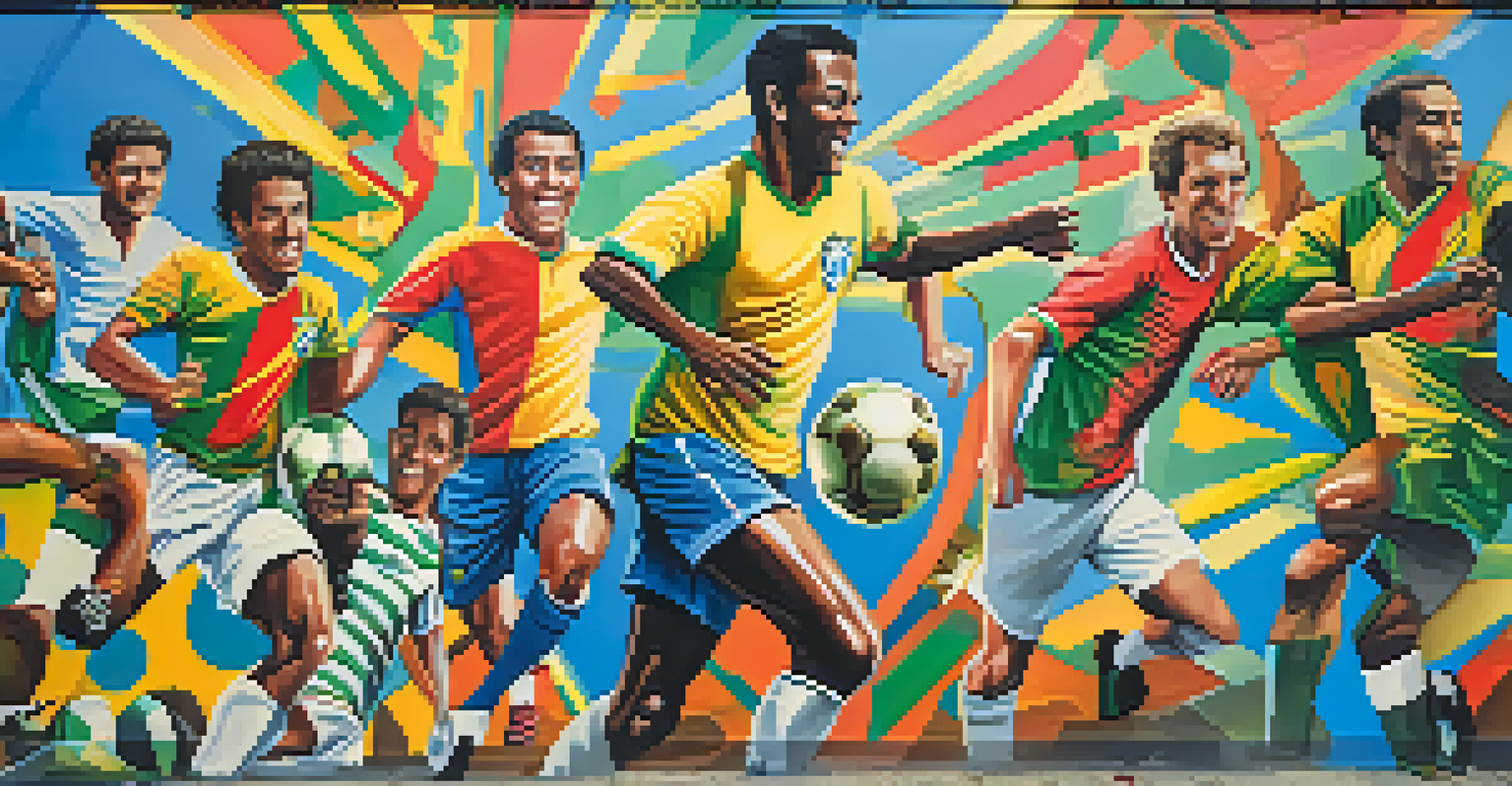The Impact of Football on Brazilian Culture and Society

Football: A National Passion in Brazil
Football is more than just a sport in Brazil; it's a national obsession that unites people across different backgrounds. The Brazilian love for football transcends age, social class, and geography, creating a collective identity that resonates deeply within the culture. Iconic players like Pelé and Zico have become legendary figures, representing not only talent but also the dreams of millions of fans.
Football is like a religion in Brazil. It’s a way of life and a passion that brings people together.
From the streets of Rio de Janeiro to the beaches of Copacabana, football is played everywhere, often spontaneously. Children dribble makeshift balls, and adults gather to watch matches, illustrating how integral the sport is to daily life. It's not uncommon to see neighborhood games that spark friendships and rivalries alike, showcasing the community spirit that football fosters.
During major tournaments like the World Cup, the entire country comes alive with celebrations, showcasing Brazilian culture through music, dance, and vibrant displays of support for the national team. This shared enthusiasm for football fosters a sense of belonging and pride that is palpable, highlighting its role as a cultural cornerstone.
Football as a Reflection of Brazilian Diversity
Brazil's cultural diversity is mirrored in its football, where various styles and techniques come together to create a unique blend. Different regions contribute their own flair, from the samba-infused moves of the Rio players to the tactical prowess seen in São Paulo. This melting pot of influences makes Brazilian football rich and varied, much like the country itself.

Moreover, the sport has been a platform for showcasing the talents of players from all walks of life. Many athletes rise from humble beginnings, often using their skills to escape poverty and achieve international fame. Their stories resonate with fans, highlighting themes of resilience and hope, which are prevalent in Brazilian culture.
Football Unites Brazilian Society
Football is a national obsession in Brazil that transcends age, class, and geography, fostering a strong sense of community and identity.
Football clubs often serve as microcosms of Brazilian society, where fans from diverse backgrounds come together to cheer for their teams. This unity among supporters, regardless of their differences, fosters a sense of community that is both powerful and inclusive.
The Role of Football in Brazilian Festivals and Celebrations
Football is deeply woven into Brazil’s festive traditions, often taking center stage during major celebrations like Carnival. The vibrant atmosphere of Carnival is complemented by the excitement of football matches, where samba rhythms and colorful costumes create a festive backdrop. This intersection of sport and culture illustrates how football enhances the celebratory spirit of Brazilian life.
In Brazil, football is not just a game; it’s a way of expressing our culture and identity.
During these festivities, street parties often feature football displays, where local talents showcase their skills. Such events not only entertain but also strengthen community ties, as residents come together to enjoy the excitement of the game. The joyful atmosphere reminds everyone of the shared passion for football that brings people closer.
Furthermore, the World Cup and other international tournaments are celebrated almost like national holidays. Streets are adorned with flags, and public viewing areas fill with enthusiastic fans, creating an electric atmosphere that embodies Brazilian pride and passion for the sport.
Football's Influence on Brazilian Music and Art
The impact of football on Brazilian culture extends into its music and art, where themes of the sport are prevalent. For instance, samba songs often celebrate football heroes and legendary moments in matches, intertwining the rhythm of the sport with the rhythm of Brazilian life. This fusion creates an engaging cultural narrative that resonates with fans and artists alike.
Artists and musicians frequently draw inspiration from the passion and drama of football, producing works that capture the essence of the game. You can find murals depicting famous players in cities across Brazil, transforming urban landscapes into vibrant celebrations of football culture. This artistic expression reflects the deep connection between the sport and its influence on Brazilian identity.
Cultural Influence of Football
The sport significantly impacts Brazilian music and art, intertwining themes of football with cultural expressions and celebrations.
Additionally, football-related events often feature live music and performances, further blending the two cultural elements. This synergy not only entertains but also reinforces the idea that football is an integral part of Brazilian culture that deserves to be celebrated in many forms.
Socioeconomic Impact of Football in Brazil
Football's influence in Brazil isn't limited to entertainment; it also has significant socioeconomic implications. The sport has the power to generate jobs and stimulate local economies, particularly in areas surrounding football clubs and stadiums. This economic boost can be vital for communities, especially in regions where other opportunities may be scarce.
Moreover, football academies and grassroots programs provide young people with pathways for personal and professional development. These initiatives not only teach valuable skills but also promote discipline and teamwork, helping participants to build character and confidence. For many, these programs represent a chance for a better future through sport.
The visibility of successful football players can also inspire youth to pursue their dreams, illustrating that hard work and talent can lead to great achievements. This aspirational aspect of football encourages young Brazilians to strive for excellence, both on and off the field.
Challenges Facing Football in Brazilian Society
Despite its numerous benefits, Brazilian football faces various challenges that affect its societal impact. Issues like corruption, violence, and mismanagement within football clubs can tarnish the sport's reputation and alienate fans. When negative incidents occur, they can overshadow the positive experiences that football brings to communities.
Additionally, the commercialization of football sometimes leads to a disconnect between clubs and their local supporters. As teams prioritize profit over community engagement, fans may feel less connected to their clubs, which can dilute the sense of identity that football traditionally fosters. This shift can create a rift in the relationship between teams and their loyal followers.
Socioeconomic Benefits of Football
Football generates jobs and provides development opportunities for youth, showcasing its vital role in enhancing local economies and communities.
Addressing these challenges requires a concerted effort from stakeholders, including clubs, governing bodies, and fans. By prioritizing transparency and community involvement, Brazilian football can continue to thrive as a source of pride and unity, strengthening its cultural significance in society.
The Future of Football in Brazilian Culture
Looking ahead, the future of football in Brazil remains bright, yet it will need to adapt to evolving societal dynamics. As globalization continues to influence culture, Brazilian football may see new styles and international influences shaping its identity. This evolution can be seen as an opportunity to blend traditional Brazilian techniques with new approaches, creating a richer, more diverse football culture.
Moreover, the increasing use of technology in sports, such as analytics and virtual training, may impact the way young players develop their skills. Embracing these innovations can enhance Brazil's already exceptional football talent and maintain its status as a football powerhouse. However, it is crucial to balance technology with the traditional values that have long defined Brazilian football.

Ultimately, as long as the passion for the game remains, football will continue to play a vital role in shaping Brazilian culture and society. The love for the sport will likely endure, fostering community, identity, and pride for generations to come.